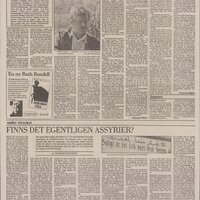-
Title
-
Are there really Assyrians?
-
Type
-
Newspaper
-
Creator
-
Ingmar Karlsson
-
Date
-
1986
-
Description
-
The article “Finns det egentligen assyrier?” (“Do Assyrians Really Exist?”) by Ingmar Karlsson examines the question of whether the modern people who call themselves Assyrians are in fact descendants of the ancient Assyrians of Mesopotamia, or whether the name represents a more recent historical and cultural construction.
Karlsson begins by outlining the background of the modern Assyrian movement in Sweden, which gained strength in the 1970s when immigrants from southeastern Turkey and northern Syria began identifying themselves as Assyrians. He explains that the ancient Assyrian Empire was destroyed in 612 BCE, and with its fall, the Assyrians disappeared from history as a political and ethnic entity. The groups that today call themselves Assyrians, he argues, do not originate from that ancient population. Instead, they descend from Syriac-speaking Christian communities that emerged centuries later in Mesopotamia. These Christians, who belonged to what became the Syriac Orthodox and Chaldean Catholic churches, spoke Aramaic rather than the ancient Assyrian language.
The article emphasizes that the designation “Assyrian” has no direct ethnic continuity with the Assyrian Empire. Karlsson notes that the use of the term in modern times is mostly coincidental, a result of later historical developments and church traditions rather than of an unbroken ethnic lineage. He traces the evolution of these Christian communities, describing how the Church of the East, the Chaldeans, and the Syriac Orthodox Church all developed from early Mesopotamian Christianity. Over time, the Syriac language replaced earlier local tongues and became a major liturgical language in the region.
Linguistically, Karlsson stresses that the modern Assyrian or “Syriac” language spoken today is not derived from the ancient Assyrian tongue but from Aramaic. The ancient Assyrian cuneiform script and its Semitic language vanished long before the birth of Christ. Modern Assyrians speak various Neo-Aramaic dialects that have been heavily influenced by Arabic and other regional languages. He further notes that the term “Assyrian” gained new meaning in the nineteenth and twentieth centuries as part of a nationalist revival among Syriac-speaking Christians. This revival, particularly in the diaspora, sought to unite different Syriac Christian groups under a common historical label, using the name “Assyrian” to evoke the grandeur of the ancient empire and to assert continuity and identity in modern times.
Karlsson concludes that the modern Assyrians are not ethnically descended from the ancient Assyrians. Instead, they are the cultural and religious heirs of ancient Mesopotamian Christianity who adopted the Assyrian name as a historical and symbolic identity rather than an ethnic one. For him, “Assyrian” today is a cultural and ecclesiastical designation used to express unity and heritage, not a literal continuation of an ancient people.
-
Language
-
Swedish
-
Publisher
-
Svenska Dagbladet
-
Subject
-
Syriac Origin
 Gi8uwtYXkAAB2BE.jpeg
Gi8uwtYXkAAB2BE.jpeg 
